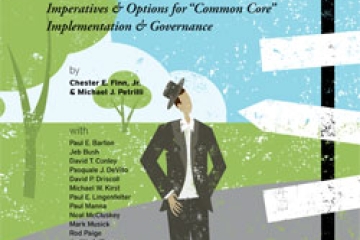The Common Core is at a critical juncture. While many surveys show that support for the standards themselves remains strong, implementation has not been without major challenges.
State Accountability in the Transition to Common Core, a new policy brief from the Thomas B. Fordham Institute, provides cautionary advice about what key policymakers and influentials in a handful of states now see as transition challenges. In August and September 2013, the research team at Fordham interviewed officials and policy advocates in five states (Arkansas, Colorado, Florida, Massachusetts, and New York) to glean how they are approaching accountability in the transition to the Common Core. While we found nuances in each state, four trends emerged.
- The accountability moratorium is here. Punitive consequences associated with accountability are largely being put on hold during the transition to the Common Core.
- Overall, states are treading carefully and strategically with assessments, since the quality of the forthcoming tests is still unknown.
- While state education agencies express conviction that teachers are being adequately prepared to teach the new standards, the quality and effectiveness of Common Core trainings and professional development is unclear.
- Though ESEA waivers were granted to give states additional flexibility, states are now finding themselves locked into a set of new, yet still restrictive federal policies.
Correction: An earlier version of this brief noted that New York had delayed using test scores in teacher evaluations. The state is considering such a delay.
____________
If you have questions about the book, please email Victoria Sears.




